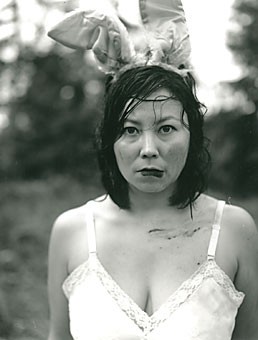Tomiko Jones, a fine arts graduate student who is mainly a photographer, enjoys using all mediums of art to portray her ideas. Installation pieces, like the one she presented at the second year graduate student art show Friday at Fremont House, are a speciality of hers. “”Negotiate”” featured a humid room that was separated from the house by thick black sheets that induced a creepy feeling of being out of control. For more information on Jones and her work, visit her Web site at TomikoJonesPhoto.com
Wildcat: How would you describe your piece that was in the Fremont House exhibit Friday night?
Jones: Well, the piece is meant to occupy space in a way that when you enter it, it should change the psychological state you are in. By using the elements of water, it created a humidity that you felt and by controlling the space by the use of light and darkness, the idea is to create a feeling of something in itself. It’s an image of a psychological space.
W: How would you paint your death?
J: It would be a wispy cloud – in the sunset when there’s that one lonely cloud that’s lit up against the dark sky, the way clouds light up right before darkness falls.
W: How would you describe your art?
J: I use a visual medium to tell you about something bigger. It’s about negotiating. For my art in general, I use whatever visual tools I can to illustrate a concept instead of a noun. Like here’s a picture of a tree, but maybe that tree is talking about something bigger. Instead of showing you a picture of a prison cell or a picture of a border crossing, that piece last night is more like what they might feel like, how that might change you psychologically instead of showing it to you directly.
W: Would you rather have to eat nothing but orange Jell-O for the rest of your life or have to eat a piece of dog poop once every month?
J: I would take the poop too because you’d want to be able to eat other food. I think if you only ate Jell-O you’d probably die of malnutrition soon enough anyway. I’d rather suffer just a little bit to have the joy of eating delicious food.
W: What do you think is the most pertinent global issue today?
J: A need for more global economic equity. Because of the way our economic structure is set up with a colonial imperialist situation of people with money and countries with money and the able extracting labor and resources from countries that don’t. That’s what I feel like is the root for what’s going on in Iraq.
W: What’s the worst thing anyone has ever said about your art?
J: Two things – I think they’re both kind of funny though. The first was, “”It looks like the work of a student.”” I thought it was funny because I wasn’t a student and I was thinking, “”What do you mean by that?”” The other thing was that it’s like an eighth grader’s diary. Both these things that people have said to me were anonymous insults; no one ever says it to me in person. Oh and someone once said, “”If Ansel Adams saw this, he would roll over in his grave.”” I guess that’s an insult, but I think it’s pretty funny.
W: What is your favorite band or style of music and why?
J: My favorite music comes from Filistine. Filistine is a musician/producer, and he kind of does sound collages and things from all over the world and brings them together in a really interesting, smart way. He brings politics into it under the surface and is working with musicians from Nigeria to Spain to create a global network which is super important in this era.
W: What do you do in your free time for fun?
J: I love to travel. I like to play capoeira. That’s it. I like to enjoy the amazing desert landscape that we live in. I like to go hiking.
W: Where do you see yourself in five years?
J: I think I’ll probably be living in Asia. I spent some time there, and I feel like there’s some really amazing work coming out of Asia and I really just want to get out of the West fora while. That’s where my roots are and I think it’d be good to get a different perspective.









